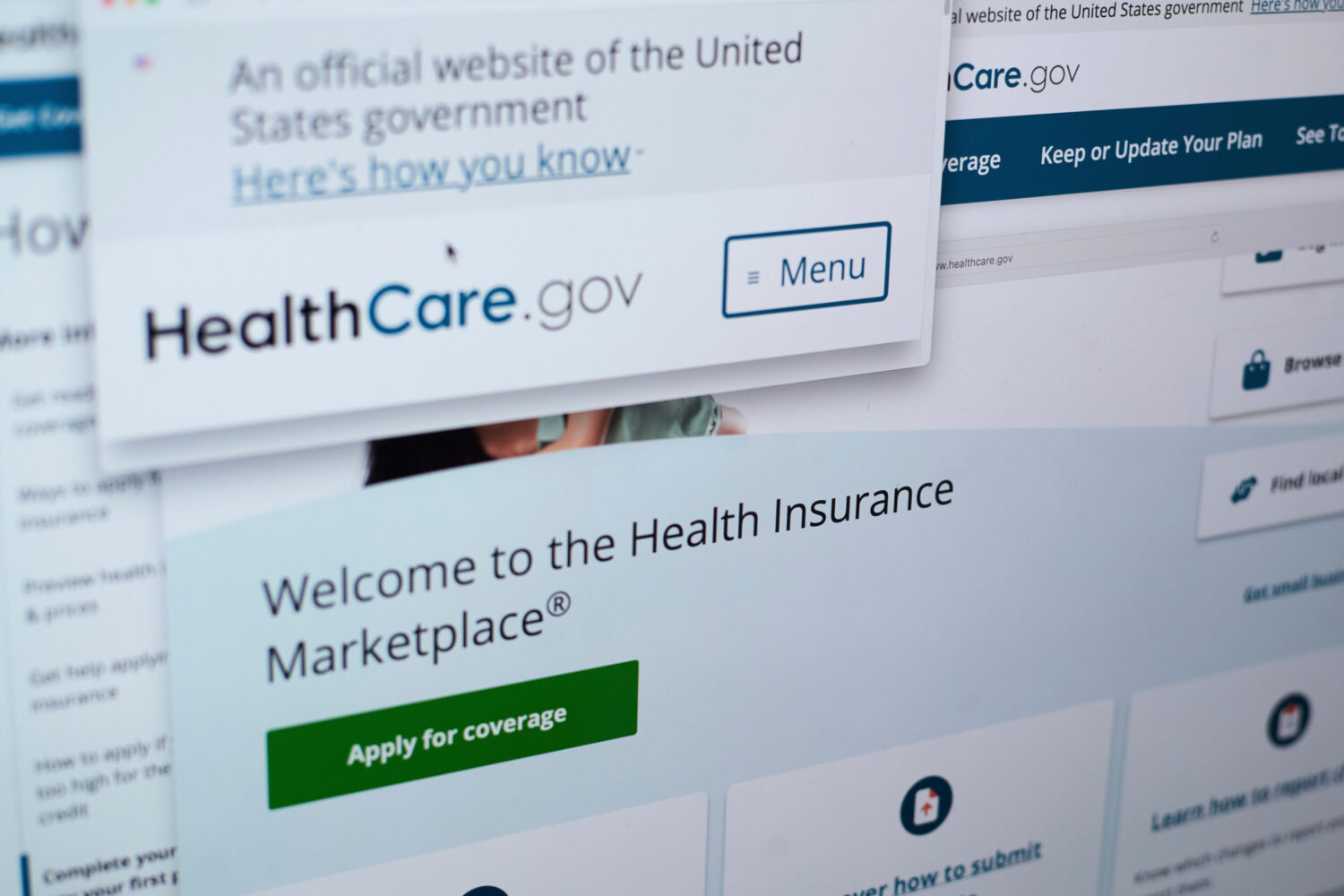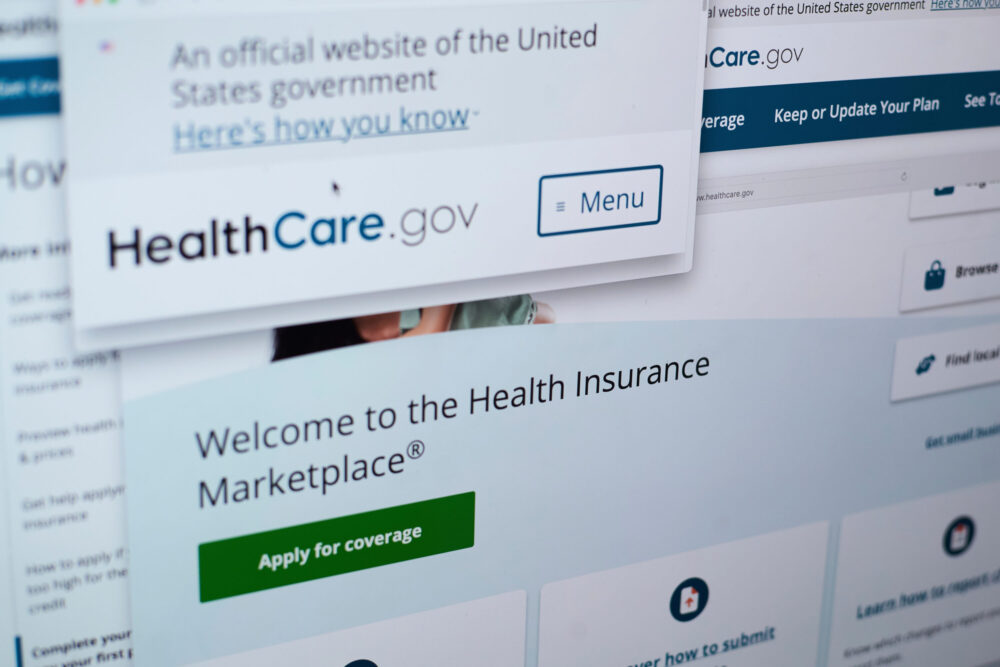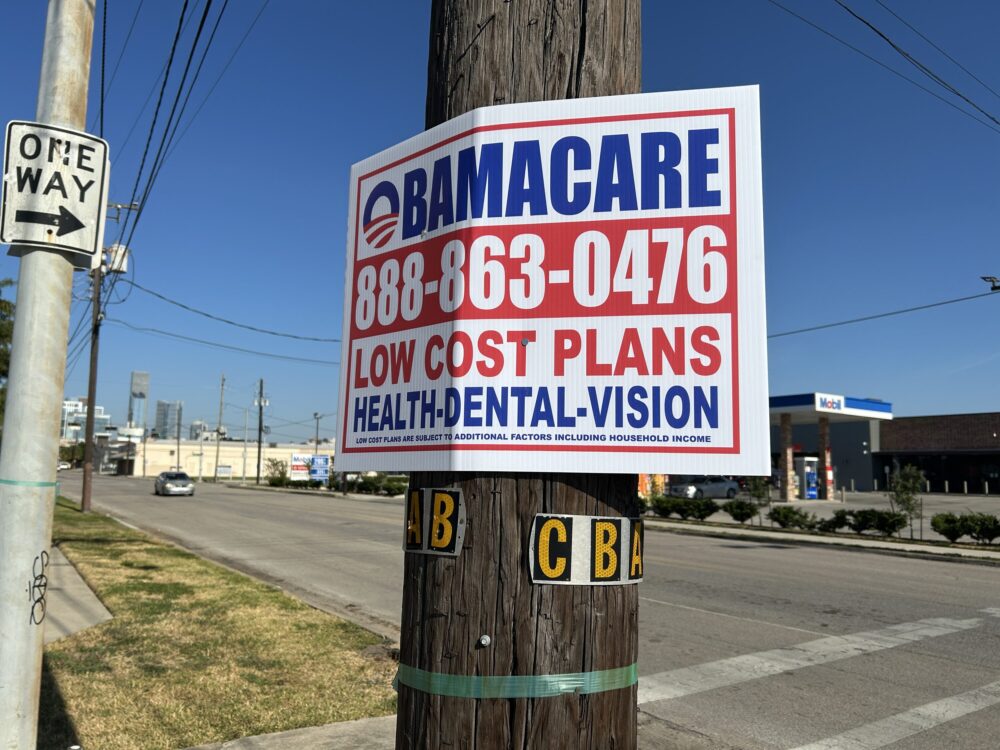AP Photo/Patrick Sison, File
Pages from the U.S. Affordable Care Act health insurance website healthcare.gov are seen on a computer screen in New York, Aug. 19, 2025.
Felecia Suber spent weeks calculating, agonizing over and bracing for what her son’s new monthly health care premiums might be when enrollment opened Nov. 1 for insurance plans under the Affordable Care Act, or ACA.
“I knew it was going to happen and it actually jumped hundreds of dollars,” Suber said.
When Michael Suber lost his job in law enforcement, his mother was able to help secure him an affordable health care plan under the ACA’s current tax credits, which cost him $45 per month. The best plan the Subers can find for Michael now will cost him $479 per month.
The sticker shock has the Houston family continuing to weigh its options among the various high-priced plans.
“We still may just go to a catastrophic plan and just hope for the best,” Felecia said. “He’s a very healthy, athletic young man, he takes care of his body really well. Of course, anybody could get in an accident tomorrow. Things like that happen.”
The tax credits were introduced in 2021 during the pandemic under the American Rescue Plan Act. The goal was to provide temporary relief for families by helping to lower monthly premiums. The breaks were later extended under the Inflation Reduction Act in 2022.
They are set to expire at the end of this year, and debate over extending the tax credits is at the center of the federal government shutdown, which started Oct. 1 and is now the longest shutdown in U.S. history.
Democrats say the tax breaks have allowed millions of people access to affordable health care plans, and they want to see them made permanent. Republicans counter that the tax credits are too costly and were never meant to be permanent, and they are pushing to pass a continuing resolution to reopen the government before addressing the ACA tax credits.
Some House Republicans have recently begun considering a tax credit proposal that would impose an income cap on eligibility, among other things.
In an appearance last month on “Houston Matters,” U.S. Rep. Dan Crenshaw, R-Houston, argued against extending the tax credits.
“You make them permanent, you’re talking about almost $500 billion in costs over the next 10 years,” Crenshaw said.
Cost vs. coverage
The Congressional Budget Office estimated in September that $350 billion would be added to the national deficit from 2026-2035 if the credits were kept. The office also noted the credits would help insure an additional 3.8 million people.
But Crenshaw and other Republicans say the credits don’t address the central cause of rising health care costs.
“Insurance premiums are not going up because the government isn’t subsidizing them enough,” Crenshaw added on Houston Matters. “They’re going up because the government subsidizes insurance companies over patients.”
Bianca Seward/Houston Public Media
A flyer hangs from a utility pole in Houston.
Blake Hutson, the vice president of public affairs for the Texas Association of Health Plans, says he understands the frustration but doesn’t agree the solution is cutting the tax credits.
“There is no organization in Austin more frustrated with health care costs than my organization, and we support a wide range of initiatives to try to get a handle on that,” Hutson said. “Unfortunately, the loss of tax credits are not coming with any new ideas to really get a handle on health care spending. I agree we need to do something about the broader issue, but in the meantime, people need to be able to afford their health care coverage.”
‘Ground zero’
Nearly 2 million Texans are expected to lose their health insurance when the tax credits expire, according to KFF, a health policy and research nonprofit.
If the credits expire, experts point to a cascade of consequences.
KFF also reports that more than 40% of adults who buy their own health insurance would drop coverage if their premiums doubled. The Commonwealth Fund projects a lack of health care funding brought in by the tax credits would cause state economies to lose more than $40 billion and nearly 400,000 jobs would be lost in 2026.
Texas sits at the top of the Commonwealth Fund’s job loss projection if the tax credits expire – with nearly a quarter of the projected job losses in the Lone Star State.
Hutson called Texas “ground zero” for the worst impacts of losing the enhanced tax credits. The state is one of only 10 that chose not to expand Medicaid, making the ACA marketplace a key source of coverage. Nearly 4 million Texans are enrolled in ACA plans — the highest number in the nation — which has helped lower the state’s uninsured rate, though Texas still leads the country in the number of people without health insurance.
“If you combine Texas and Florida, it’s probably about half of everyone who loses insurance just among those two states,” Hutson said. “You look at other states like California, a little over 100,000 people lose coverage. Well, in Texas, it’s tenfold that. So I feel like that’s getting a little missed here is that this hits the worst at home, and it’s not even close.”
Non-employer coverage can also impact insurance accessibility. Texas is home to more than 3 million small business owners, one of the highest populations in the country.
RELATED: Texas applies for $1 billion in federal funding for rural health initiatives
“We are a small business state and we know that no less than about 25% of small businesses these days even offer health insurance, so we have a lot more of those folks that need to go buy coverage on their own,” Hutson said. “You can also think about rural Texas where you have a lot of folks that are working for themselves, maybe farmers, maybe ranchers, these kinds of folks where they just don’t have coverage through work and they need coverage. They want coverage. What we know is that when coverage is affordable, which is what the enhanced tax credits did is [make] coverage affordable. When coverage is affordable, people will buy it.”
‘Stock up’
Felecia Suber and her son will continue to shop the ACA marketplace in hopes of finding a plan they can afford and that also gives them peace. She is frustrated with members of Congress for the lack of action and says she hopes Tuesday’s election – in which Democrats won key races across the country after a 2024 presidential election dominated by Republicans – will prompt action.
“[Republicans are] probably kind of thinking this is hurting us, and so we’re just really praying and hoping that some changes will be made,” she said. “Because people without a job, without money to eat, and having to pay these enormous prices for health care, it’s just not possible. It’s not possible. It’s very frustrating.”
For now, Felecia says she and others should prepare to pay higher premiums. Open enrollment for the ACA marketplace ends Jan. 15.
“If you have insurance, get into the doctor now,” she said. “Get stocked up on your blood pressure medicines. Get stocked up on your maintenance medicines that you need to have. It’s going to be rough for a lot of people. It really is.”


